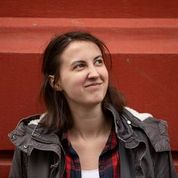
Ayah Ahmad, a nineteen-year-old high school student and assistant teacher held a speech last weekend at a Tungumálatöfrar (“Language Magic”) seminar.
Tungumálatöfrar is an association of people interested in multilingualism and multiculturalism, as well as an annual Icelandic language summer course for multilingual children in Ísafjörður.
Ayah Ahmad was one of the people who spoke at a seminar, which was held at the Edinburgh House in Ísafjörður on teaching Icelandic in a multicultural society. The seminar was based on experiences of teaching methods in the summer course and discussed, among other things, innovation in study methods and study materials and ways to increase the participation of immigrants in leisure activities during the summer.
The Tungumálatöfrar event was also streamed on Facebook, according to bb.is, due to gathering restrictions.
In her speech, that Fréttablaðið also reported on, Ayah spoke about her experiences of coming to Iceland and her dream to study pharmacology at the University of Iceland.
Ayah and her family moved to Iceland, specifically Ísafjörður, in March 2018 after having fled the civil war in Syria and living in Jordan for six years. She talked about her and her family’s treatment there, how they had to face predjudice and stigma because of their status as refugees, a term Ayah has grown to hate, she says.
When the family ran into trouble, they had to move to Iceland. Ayah also spoke about the difficulties she had to face here, missing her friends and the cold so high up north. Icelandic also proved to be a hurdle, being a completely new language with an unknown alphabet.
“I was in my final year of high school in Jordan. I had just graduated and gone to college with my friends.”
In Iceland, Ayah had to start high school again and was told that finishing school would take up to five years, due to the language difficulty. She ended up finishing in three years like the other students and also becoming a Tungumálatöfrar assistant teacher.
“I had to meet new people I had never seen before. But with the help of teachers and people in Iceland, I was able to learn Icelandic. This was all with the help of the best teacher in the world, Sólrún Geirsdóttir. I want to thank her for her help and all the help in learning Icelandic. The people here in Iceland are so good and so sweet and always smile and after a while I no longer felt weird,” Ayah says.
Although difficulties prevail. She and her family have faced difficulties traveling due to their status as refugees and in Iceland as well, for instance when COVID-19 hit the country and people started treating Ayah differently.
“I went to Nettó, for example, everyone was running away from me, just because I’m not from Iceland. I was sad and told them I was from a different culture and wore a headscarf, but that does not mean I have the virus,” says Ayah.
She says she hopes things will return to normal, that people will see her as part of society and that she will be able to follow her dream of studying pharmacology at the University of Iceland.
“But I think I will not get to university until I have learned better Icelandic. I want to learn Icelandic and study Icelandic so I can make my dreams come true.”
Ayah say that the experience as an assistant teacher for the past two years at Tungumálatöfar, which is aimed at multilingual children aged 5 to 11, is invaluable and she hopes that she can take part in Tungumálatöfar every year.
“We can all be who we are and we are all from different countries and we all speak different languages but we all sit at the same table and eat together and we are all human. And it’s fun to work with children.”
You can watch a recoding made by Fréttablaðið of Ayah’s speech here or below.
(Correction: This article originally stated that Ayah is from Jordan. She is in fact from Syria. The article has been corrected accordingly.)
Note: Due to the effect the Coronavirus is having on tourism in Iceland, it’s become increasingly difficult for the Grapevine to survive. If you enjoy our content and want to help the Grapevine’s journalists do things like eat and pay rent, please consider joining our High Five Club.
You can also check out our shop, loaded with books, apparel and other cool merch, that you can buy and have delivered right to your door.
Buy subscriptions, t-shirts and more from our shop right here!

















